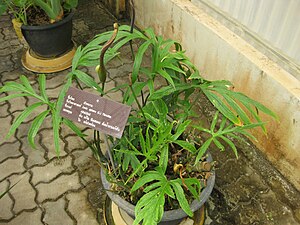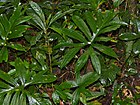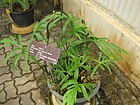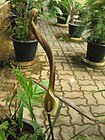Note: This is a project under development. The articles on this wiki are just being initiated and broadly incomplete. You can Help creating new pages.
Difference between revisions of "Lasia spinosa"
(→Uses) |
|||
| Line 2: | Line 2: | ||
'''Lasia spinosa''' is an evergreen, herbaceous perennial plant growing 1 - 2 metres tall, spreading by means of a long, creeping, stoloniferous stem. The plant is harvested from the wild for its edible leaves and various medicinal uses. It is also sometimes cultivated as a vegetable crop along the margins of ponds. | '''Lasia spinosa''' is an evergreen, herbaceous perennial plant growing 1 - 2 metres tall, spreading by means of a long, creeping, stoloniferous stem. The plant is harvested from the wild for its edible leaves and various medicinal uses. It is also sometimes cultivated as a vegetable crop along the margins of ponds. | ||
==Uses== | ==Uses== | ||
| − | {{Uses|Lymphotuberculosis}}, {{Uses|Lymphonoditis}}, {{Uses|Stomach aches | + | {{Uses|Lymphotuberculosis}}, {{Uses|Lymphonoditis}}, {{Uses|Stomach aches}}, {{Uses|Snake bites}}, {{Uses|Insect bites}}, {{Uses|Injuries}}, {{Uses|Rheumatism}}, {{Uses|Throat ailments}}, {{Uses|Piles}}.<ref name="Uses"/> |
==Parts Used== | ==Parts Used== | ||
Latest revision as of 11:58, 30 May 2020
Lasia spinosa is an evergreen, herbaceous perennial plant growing 1 - 2 metres tall, spreading by means of a long, creeping, stoloniferous stem. The plant is harvested from the wild for its edible leaves and various medicinal uses. It is also sometimes cultivated as a vegetable crop along the margins of ponds.
Contents
- 1 Uses
- 2 Parts Used
- 3 Chemical Composition
- 4 Common names
- 5 Properties
- 6 Habit
- 7 Identification
- 8 List of Ayurvedic medicine in which the herb is used
- 9 Where to get the saplings
- 10 Mode of Propagation
- 11 How to plant/cultivate
- 12 Commonly seen growing in areas
- 13 Photo Gallery
- 14 References
- 15 External Links
Uses
Lymphotuberculosis, Lymphonoditis, Stomach aches, Snake bites, Insect bites, Injuries, Rheumatism, Throat ailments, Piles.[1]
Parts Used
Chemical Composition
Common names
| Language | Common name |
|---|---|
| Kannada | |
| Hindi | |
| Malayalam | |
| Tamil | |
| Telugu | |
| Marathi | |
| Gujarathi | |
| Punjabi | |
| Kashmiri | |
| Sanskrit | |
| English |
Properties
Reference: Dravya - Substance, Rasa - Taste, Guna - Qualities, Veerya - Potency, Vipaka - Post-digesion effect, Karma - Pharmacological activity, Prabhava - Therepeutics.
Dravya
Rasa
Guna
Veerya
Vipaka
Karma
Prabhava
Habit
Identification
Leaf
| Kind | Shape | Feature |
|---|---|---|
Flower
| Type | Size | Color and composition | Stamen | More information |
|---|---|---|---|---|
| {{{5}}} |
Fruit
| Type | Size | Mass | Appearance | Seeds | More information |
|---|---|---|---|---|---|
Other features
List of Ayurvedic medicine in which the herb is used
Where to get the saplings
Mode of Propagation
How to plant/cultivate
Found in the wild at low to moderate elevations in tropical and subtropical areas.[4]
Commonly seen growing in areas
Swamps, Riverbanks, Ditches, Moist places in tropical forest, Moist places in subtropical forests.
Photo Gallery
References
- ↑ Indian Medicinal Plants by C.P.Khare
- ↑ [Chemistry]
- ↑ [Morphology]
- ↑ Cultivation
External Links
- Ayurvedic Herbs known to be helpful to treat Lymphotuberculosis
- Ayurvedic Herbs known to be helpful to treat Lymphonoditis
- Ayurvedic Herbs known to be helpful to treat Stomach aches
- Ayurvedic Herbs known to be helpful to treat Snake bites
- Ayurvedic Herbs known to be helpful to treat Insect bites
- Ayurvedic Herbs known to be helpful to treat Injuries
- Ayurvedic Herbs known to be helpful to treat Rheumatism
- Ayurvedic Herbs known to be helpful to treat Throat ailments
- Ayurvedic Herbs known to be helpful to treat Piles
- Herbs with Young leaves used in medicine
- Habit - Evergreen perennial
- Index of Plants which can be propagated by Seeds
- Herbs that are commonly seen in the region of Swamps
- Herbs that are commonly seen in the region of Riverbanks
- Herbs that are commonly seen in the region of Ditches
- Herbs that are commonly seen in the region of Moist places in tropical forest
- Herbs that are commonly seen in the region of Moist places in subtropical forests
- Herbs
- Pages without herbs images





